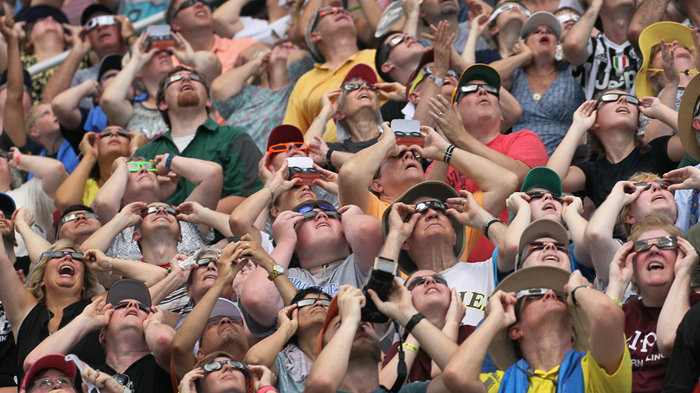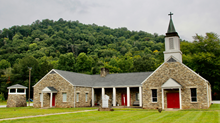
The plan in Vallonia, Indiana, involves moon pies.
The sun will start to disappear at 1:49 p.m. The wide blue sky that stretches over the cornfields and soybeans along State Route 135 will grow darker and darker, until, after about an hour and 15 minutes, the small farming community of 379 souls will be cast into night.
The moon—invisible to the human eye except as an empty space—will overshadow everything. For a minute, and then two, and then three, stars will be visible in the sky. The colors of the world will seem all wrong. And Vallonia will pass through eclipse totality.
At Driftwood Christian Church, people will look up at the sky and say, “Wow!” and “Ooo!” and “Look at that!” And they will munch on moon pies decorated with the words of Jesus in John 8:12: “I am the light of the world. Whoever follows me will never walk in darkness.”
Pastor Daniel Ison said it was the church’s evangelism committee that came up with the plan. They bought the cookie-and-marshmallow snacks and wrote out the Scripture verse, over and over, hundreds of times.
The Independent Christian Church of about 170 doesn’t know how many visitors they’ll get. But they expect a lot of people will drive out to see the eclipse on Monday, April 8. The celestial phenomenon is a rare thing and there won’t be another one in the contiguous US for another 20 years. So the congregation decided to open up the church, its bathrooms, and the field around their building to welcome out-of-town visitors to a celebration of creation.
“That God created something like this for us to enjoy—God’s just like, Enjoy my creation, on an epic scale!—I think you just have to be in awe,” Ison told CT. “Even the fact that the size of the moon and the distance between the moon and the sun has to be exact for this to be a thing—the majesty of it is amazing.”
Driftwood is one of many evangelical congregations in the path of totality that is planning a big event for the eclipse, a little more than a week after Easter. In addition to moon pies, churches from Texas to Maine will be feeding people ice cream, passing out eclipse-themed tracts, selling T-shirts that say “In him there is no darkness at all” (1 John 1:5), and giving away NASA-approved eclipse glasses.
This week Christians are busy inviting friends, neighbors, and strangers to join them for an experience of awe.
“It’s an emotional thing to see a solar eclipse,” said Jeff Stone, a Southern Baptist in Kerrville, Texas, where totality will start at about 1:32 p.m. central time and last more than four minutes. “It’s technically amazing, but it’s also visceral. It’s a visceral experience and you start to wonder about the universe and God and everything God puts in your path.”
Stone, who is known in the Kerrville area as “Mr. Eclipse,” though he says people don’t call him that to his face, saw his first total eclipse in Mexico in 1991. He and his wife were so moved and amazed that they threw themselves into astronomy. They built their own telescope—four-feet long with an eight-inch mirror that they ground by hand, just like Isaac Newton, though Newton probably didn’t do it in his kitchen.
A few years later, Stone went to work for NASA at the Lyndon B. Johnson Space Center in Houston. He worked for mission control, training future astronauts how to fix mechanical things in space.
He knows how an eclipse can change your life. And for him, science has always been a part of his faith, Stone told CT.
“I look at the night sky and think, Thank you, Lord, for the opportunity to see this,” he said. “I try to share that with other people and try to help them have that kind of wonder.”
Since Stone has retired, he’s joined the city of Kerrville’s eclipse committee and has kept up a full schedule of talks. A few weeks before Easter, he was averaging two talks a day in schools, churches, homeowners’ associations, Rotary clubs, and anywhere else they wanted him. He can talk for 10 minutes or 90 on the mechanics of eclipses, why they happen when they happen, and how to prepare to view them safely.
He always makes a point of saying the eclipse is part of the design of creation.
“That kind of gets people—surprises them,” Stone said. “We’re living in a weird time and people are sort of afraid to admit their spiritual side. Something like this draws it out of them a little bit. Our pastor has been talking about how you have to be aware of what’s going on around you and who God puts in your path, and I’m trying to do that.”
Nine hundred miles north in Carbondale, Illinois, Phil Nelson is also on the lookout for people God puts in his path. He has about 30,000 tracts to give them.
The tracts are printed in glossy color on high-quality paper. The front has an artist’s rendering of an eclipse. The back has a message: “God has a way for you to escape everlasting darkness.” Nelson expects people will keep them as souvenirs, so they will not only read them the day of the eclipse but save them, and read them again in the future.
Carbondale is the eclipse crossroads of America. It’s at the intersection where the path of totality will cross the path that the last eclipse cut across the country seven years ago. Back in 2017, 200,000 visitors showed up to witness the event in the Southern Illinois college town.
Nelson and members of Lakeland Baptist Church passed out eclipse tracts that year too, but they were disappointed with how few people wanted to engage in deeper spiritual questions.
“It was kind of a party scene,” the Southern Baptist pastor said.
He’s hopeful that this year, more people will ask questions. He expects some, at least, about the end times.
There’s an image going around social media making wild speculations about the prophetic import of the eclipse, claiming the path of totality will go through six places named Nineveh. Jesus once spoke about the “sign of the prophet Jonah” (Matt. 12:39), who went to the original Nineveh to proclaim God’s judgment.
The image is wrong. The path of totality will only pass through Nineveh, Indiana, and Nineveh, Ohio. It will miss the Ninevehs in Texas, Pennsylvania, and New York, as well as two others in Missouri and Virginia. A town in Nova Scotia with the same name will experience a partial eclipse. Also, Jesus is pretty clear the sign of Jonah is not an astronomical event but “the Son of Man” spending “three days and three nights in the heart of the earth” (Matt. 12:40).
Nelson said he’s “not a date-setter” anyway, and doesn’t think the eclipse portends the apocalypse. But if people ask him if the eclipse is a sign, he’s ready with an answer.
“It’s a sign that God is pursuing you,” Nelson will say. “He arranged the planet and the moon and the star to call you to himself. You came to Carbondale for this reason.”
Other evangelicals have similar plans to redirect end times inquiries.
“We’re not saying, ‘Repent, the end is near!’” said David DeFelice, an elder at Hope Church in Brunswick, Ohio. “You should repent. But we don’t know how near the end is.”
The Christian and Missionary Alliance congregation is calling their event “Glory in the Skies.” The focus will be on Psalm 19:1 and how the eclipse reveals something important about who God is.
“It points to a creator God who loves beauty and patterns of regularity,” said DeFelice, who worked 38 years as an engineer and communicator at NASA’s John H. Glenn Research Center in Cleveland. “It points to the design of an awesome creation and we want to point to that.”
The eclipse in the suburb 20 miles south of Cleveland will start at about 2 p.m. eastern time. The moon will completely cover the sun at about 3:14.
Hope Church expects to have anywhere from 500 to 2,000 people on its 10-acre campus when that happens, including children who’ve been let out of school for the day and immigrant communities who have been invited in Spanish and Ukrainian. The church also got a mini-grant from the American Astronomical Society to help pay for transportation and accessibility accommodations to bring out as many as 200 people with physical and developmental disabilities.
DeFelice hopes some of them will get an experience of community at the event and realize their lives would be better if they were part of the church.
“The slogan I came up with is ‘Join us! Don’t stay alone in the dark,’” DeFelice said. “There’s a real communal aspect to it, the awe and amazement you get, the applause and gasps. It’s better with a community.”
The pastor, Shawn Brennan, said the church has never done an astronomy-themed outreach event before, but it fits with Hope’s overall vision of serving the community.
“We want to care about what they care about,” he said. “I think the days of just existing and putting a sign out front are over. We’re trying to be intentional in our community, representing the heart of Christ and being an active presence.”
The idea for an eclipse event came up at a board meeting about six months ago, Brennan said. Three current and former NASA employees are leaders in the church, including DeFelice. He proposed they hold an event and give away NASA-approved eclipse glasses. He came up with a cool design that combines the Hope Church logo with an image of a solar eclipse and recommended the church order 5,000 of them for 59 cents apiece.
“The first thing that goes through your mind is What if it’s a crummy day in Ohio?” Brennan said. “But we moved pretty quickly to thinking this is a cool opportunity, and we’ve been praying for opportunities.”
The congregation has given away several thousand pairs of glasses ahead of the eclipse. And now people stop by the church almost every day to ask if there are any more. They often stick around for a bit, Brennan said, to ask a question about the church, share a prayer concern, or just talk about their life.
They sometimes seem surprised at how much they wanted to talk to a minister. And the minister, in turn, has been surprised at how effective eclipse glasses are at communicating the love and care of Christ to the community.
DeFelice, however, thinks it kind of makes sense. He says there’s something deeply similar about an eclipse and Jesus.
“You try to tell people about your faith and they don’t get it,” he said. “And it’s kind of the same way with an eclipse. People look at you, like, What’s the big deal? And you say, ‘Just trust me. It’s an amazing experience. Just give us a few minutes. Just try. It’s amazing.’”
So that’s why they’re giving out glasses. And why other evangelicals are giving out tracts, T-shirts, parking spots with bathroom access, and Scripture-adorned moon pies. It’s an invitation for people to come into the shadow of the moon—the path of eclipse totality—where they just might see a great light.

Support Our Work
Subscribe to CT for less than $4.25/month


















